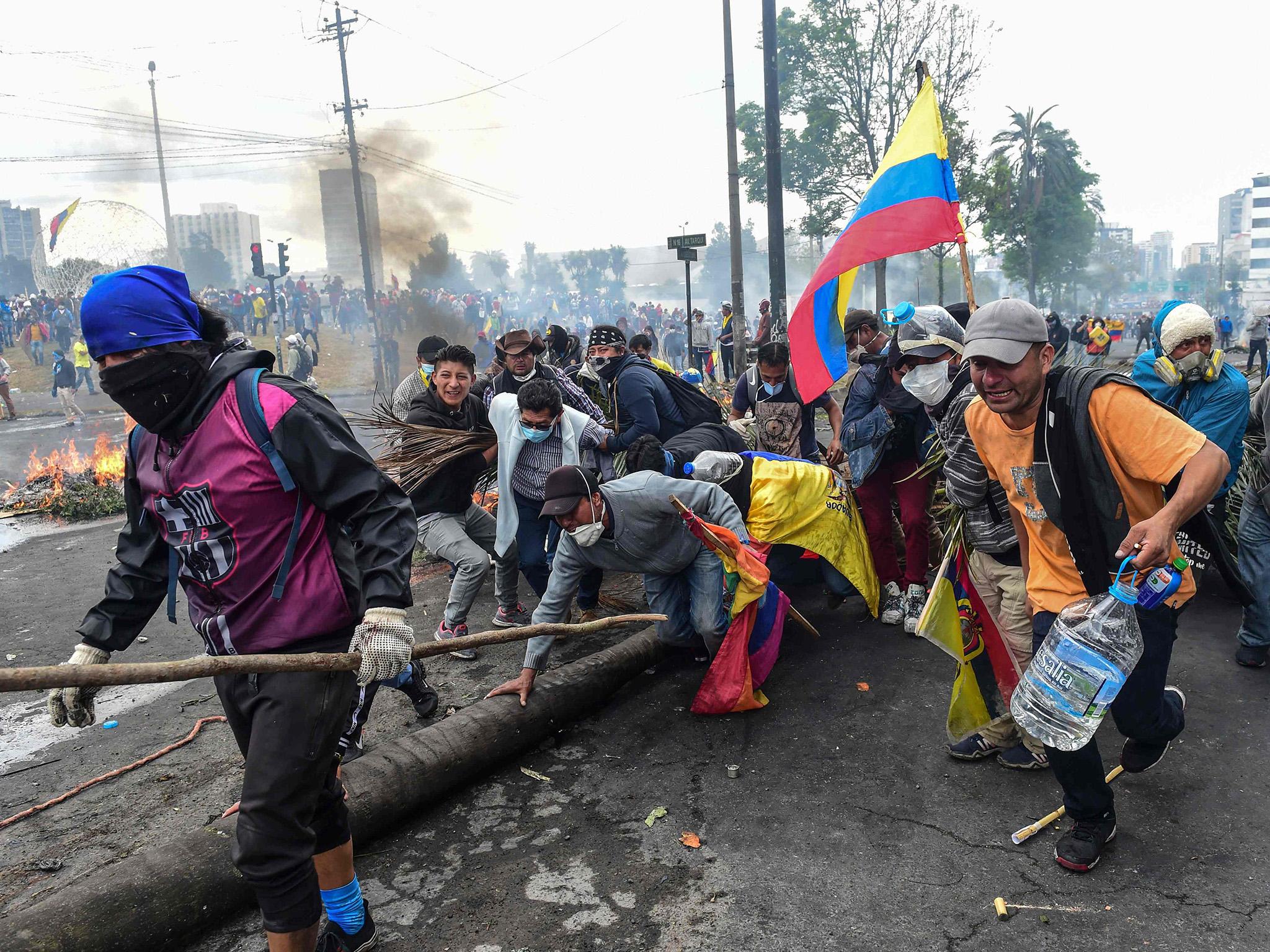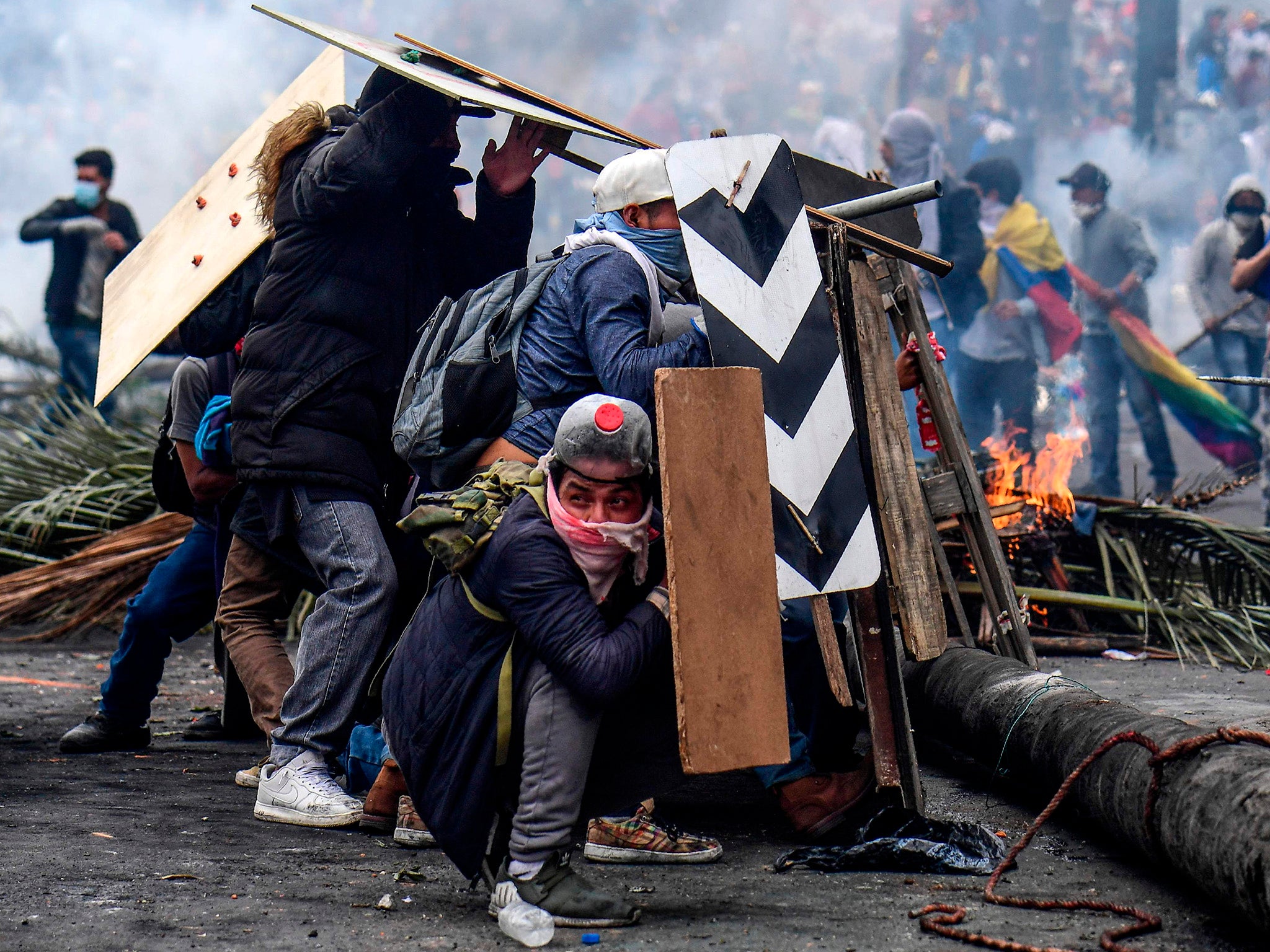Clowns, recycling and tear gas on site of clash over Ecuador's economic future
As President Moreno lays out his plan for recovery, a settlement of protesters has established in opposition

Your support helps us to tell the story
From reproductive rights to climate change to Big Tech, The Independent is on the ground when the story is developing. Whether it's investigating the financials of Elon Musk's pro-Trump PAC or producing our latest documentary, 'The A Word', which shines a light on the American women fighting for reproductive rights, we know how important it is to parse out the facts from the messaging.
At such a critical moment in US history, we need reporters on the ground. Your donation allows us to keep sending journalists to speak to both sides of the story.
The Independent is trusted by Americans across the entire political spectrum. And unlike many other quality news outlets, we choose not to lock Americans out of our reporting and analysis with paywalls. We believe quality journalism should be available to everyone, paid for by those who can afford it.
Your support makes all the difference.As a military helicopter circled overhead, a volunteer clown in a red rubber nose sang a nonsense song to laughing children outside a public theatre.
Volunteers inside handed juice and sandwiches to members of the Shuar people newly arrived from the Amazon rainforest. Some had black face paint and hand-carved wooden spears that poked above the indigenous demonstrators who’ve taken over the sprawling state-run complex known as the Casa de la Cultura.
A few blocks away, groups of young, stone-throwing protesters battled police with rocks. On Friday afternoon, the street fighters reached the main entrance of the National Assembly before they were driven back by tear gas in the fifth consecutive day of clashes in the heart of Quito, Ecuador’s capital.
This is the main field of battle for control of the economic future of Ecuador, a former member of the Order of Petroleum Exporting Countries left deeply in debt by a decade of high-spending governance and the oil price drop. Faced with a $64bn (£54.6bn) debt and a $10bn (£7.9bn) annual deficit, President Lenin Moreno is raising taxes, liberalising labour laws and cutting public spending in order to win more than $4bn (£3.2bn) in emergency financing from the International Monetary Fund.
As part of that plan, Mr Moreno eliminated a subsidy on the price of fuel on 2 October, driving the most popular variety of gasoline from $1.85 (£1.46) to $2.39 (£1.89) a gallon and diesel from $1.03 (81p) to $2.30 (£1.82). Panic and speculation sent prices soaring, with costs of some products — papayas, rural bus fares — doubling or more.
Ecuador’s indigenous people, wracked by poverty and underserved by government programmes, were infuriated. Over the last week, thousands of Shuar, Saraguro, Quechua and other indigenous people streamed into Quito from deep in the Amazon rainforest and high in the towns and villages of the Ecuadorian Andes. They have set up camp in the Casa de la Cultura, the neighbouring park known as El Arbolito and three universities, supported by thousands of protesters from Quito and surrounding areas.
At least once a day, young men with sticks and rocks surge towards the legislature and try to take it over, which they have managed to do at least once this week before being driven out with tear gas.
The protests have halted activity in much of the southern end of the capital and prompted Mr Moreno to temporarily move the seat of government to the Pacific port city of Guayaquil. Indigenous protesters also launched attacks on Amazon oil wells that have paralysed production, the country’s main export, by cutting off generators and forcing essential staff to leave.
Despite the dire situation, Mr Moreno has said he cannot restore the fuel subsidies. The country is broke and backing down to protesters would be a defeat for the president’s effort to undo the policies of his predecessor and former mentor, Rafael Correa.
Mr Moreno called on Friday for negotiation.
“The country must recover its calm,” he said on national television. “Let’s sit down and talk.”
The Confederation of Indigenous Nationalities, the umbrella group leading the protesters, issued a response that appeared to drop the demand for restoring subsidies before any talks take place.
“We insist on the necessity of direct and public dialogue in order to end or revise” the economic reform measures, a statement said.
Meanwhile, the protest base was functioning as a miniature town, with playrooms for older children, nurseries for babies and separate sleeping areas for men and women, designed to protect the female protesters and their children.

Care was provided by medical school students and volunteers brought donations of food, beverages, clothes and basic products like toilet paper. Rubbish was separated into categories for recycling.
On Friday afternoon, the park had a festival atmosphere. Families sprawled on the grass and vendors sold roast pork and skewers of chicken and sausages. Inside the Casa de la Cultura, exhausted protesters sprawled on blankets or beds of eucalyptus branches.
Mariana Yumbay, a 46-year-old law professor from Bolivar province, wore two swabs of white cotton in her nose to block tear gas drifting from the front line.
The country is in economic trouble, she acknowledged. The solution, she said, was forcing the wealthy to pay more taxes, instead of raising prices that affect the poor.
Indigenous farmers in Bolivar have no irrigation networks to nourish crops of corn and potato or herds of cattle, pigs and sheep, she said. More than 40 per cent of children are malnourished and many people live on about $30 (£24) a month.
When fuel subsidies were removed, bus drivers doubled the price of trips from the countryside into the provincial capital, Guaranda, from $2 to $4, she said.
“Unfortunately the state hasn’t had a policy of steering economic resources to pull indigenous people and farmers out of poverty,” she said.
On the floor of the complex’s largest theatre, Quechua people burned eucalyptus leaves in a memorial for protesters killed during demonstrations. An indigenous leader and four other people have died in Ecuador’s violence since last week, according to the public defender’s office.
The president’s office has reported two deaths. Hundreds of protesters have been injured and hundreds more briefly detained.
Mr Moreno has received statements of support from the Organisation of American States and individual Latin American countries that emphasise he took office as Ecuador’s constitutionally elected president in 2017.
“We recognise the difficult decisions that the government of Ecuador has taken to advance good governance and promote sustainable economic growth” US Secretary of State Mike Pompeo said in a statement on Friday. “We will continue to work in partnership with President Moreno in support of democracy, prosperity, and security.”
AP
Join our commenting forum
Join thought-provoking conversations, follow other Independent readers and see their replies
Comments